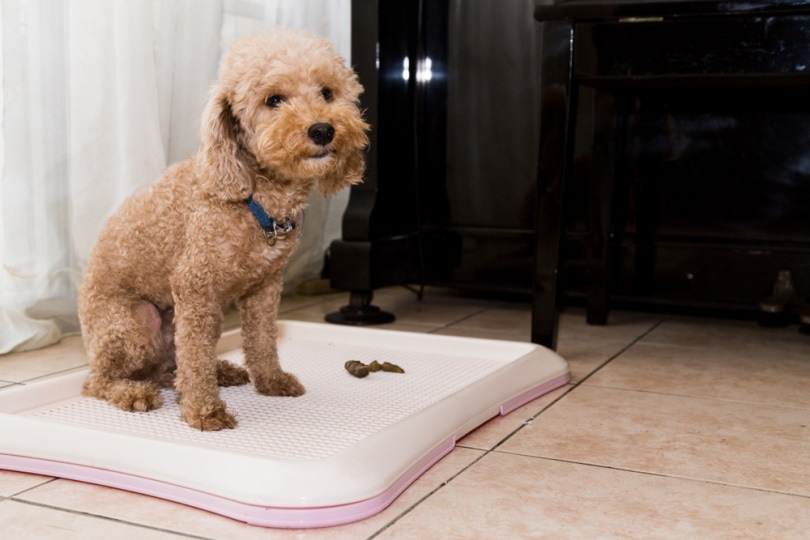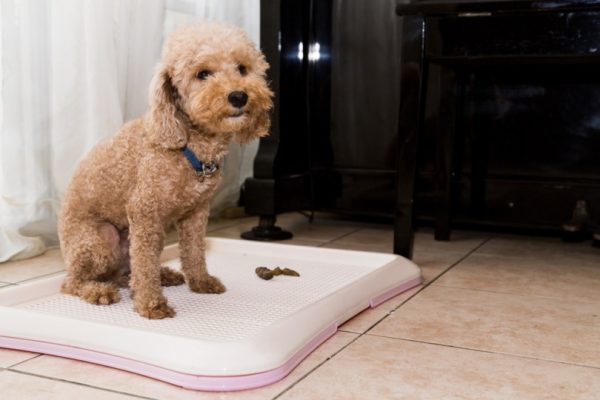There are all kinds of reasons that your dog doesn’t want to poop outside — maybe the weather isn’t so great, or your dog is easily distracted by squirrels. Finding out the reason is the first and most important step to fixing the problem, and everything else is about patience.
We go over common reasons that dogs won’t poop outside and how to handle each one.
The 8 Reasons That a Dog Might Not Poop Outside
First, we need to go over the many reasons that a dog doesn’t poop outdoors. Has your dog stopped suddenly, or have they never actually gone outside before?
In the latter scenario, you’ll need to go through the entire housebreaking routine. For the former reason, you’ll need to try to figure out why your dog has stopped. In some cases, you might already know, but there are occasions where it will take a while for you to figure it out.
The following situations are common reasons that dogs might stop pooping outside.
1. Medical Issue
If your dog was successfully pooping outside but suddenly stopped, it might be a medical problem. Sometimes, incontinence can occur when a dog has internal parasites or other gastrointestinal issues.
Some dogs might have a painful condition, like an injury or joint degeneration, such as hip dysplasia or arthritis, that makes eliminating painful. Squatting might hurt enough that the dog will avoid pooping until the last minute, and that might end up happening indoors.
What to Do
The obvious answer is that you need to take your dog to the vet. This includes any time that your dog’s behavior changes quite suddenly. It’s always best to rule out a medical problem before you focus on other issues.
2. The Dog Isn’t Fully Housebroken
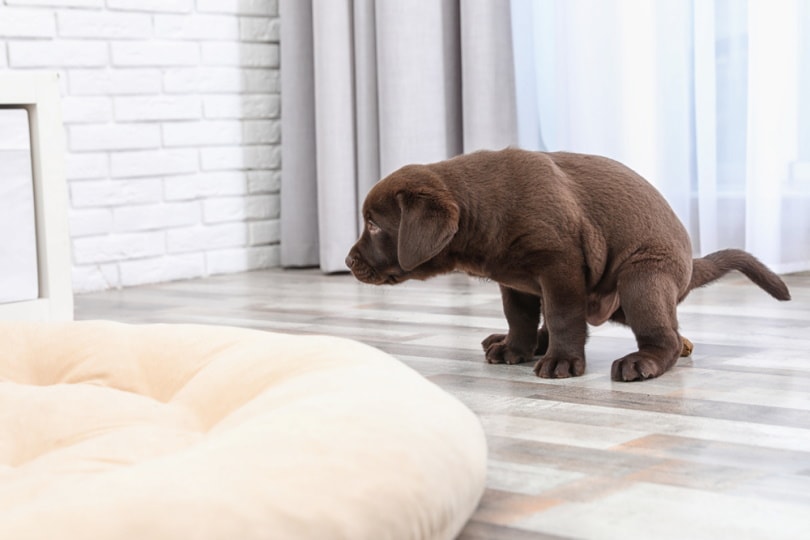
This one should be evident if you’re still training your dog. If your dog has recently been housetrained, it’s quite possible that the training just isn’t complete.
Some dog owners believe that the housebreaking has gone well and begin to allow their dog full access to the house, and then accidents start to happen.
As a general rule, your dog is probably not fully housetrained until there have been no accidents inside for at least 6 months.
What to Do
Ensure that you take your dog out on a leash at least every hour, and give them plenty of praise and a treat when they poop. If your dog doesn’t go at that time, come back inside, keep your dog on the leash (so they won’t wander off and go inside the house), and then try again in 20 minutes.
Eventually, you’ll be able to gradually increase the time between taking your dog outside, and at some point, you’ll have yourself a dog that poops outside!
3. Weather
Dogs can be drama queens! Some dogs don’t want to go outside if it’s snowing or raining or if the grass is wet.
What to Do
You could invest in coats and boots for your pup. This could make your dog feel more comfortable going outside in bad weather. It will also help keep them clean, and your house will stay clean as well.
Also, consider shoveling a spot or placing a tarp in one area for your dog. You can also think about putting up a small canopy that can give your pup a break from the rain while outside.
Otherwise, be aware of the weather. Make plans around bad weather systems and ensure that you train your dog to stay outside during bathroom breaks.
4. Surface Pickiness
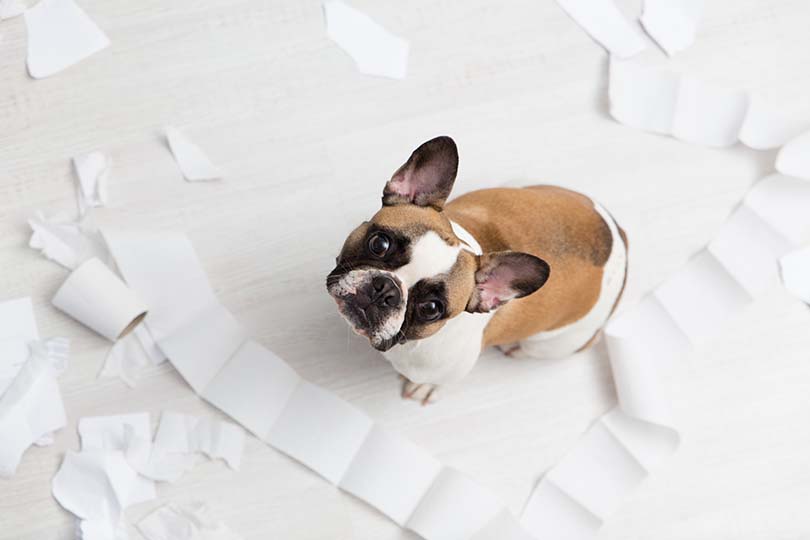
Dogs can be picky about what they go to the bathroom on. Some dogs prefer to go on grass or dirt, while others might prefer concrete.
This can also partially explain why some dogs also seem to love to relieve themselves on your carpet or hardwood floors — they’re the “right” surface.
What to Do
Once you’ve figured out what surface your dog prefers to go on, be sure there’s access to that kind of surface every time you take your dog out. Of course, this means if your backyard doesn’t have a suitable substrate, you’ll need to take your dog for a walk until you find the perfect patch of grass. You’ll need to do whatever you can to make your dog comfortable.
5. Changes and Stress
When something changes in the household, this can also lead to stress for your dog. Moving to a new place, someone new moving in, changing up your dog’s schedule, and even making a change in your dog’s diet can all cause anxiety and stress. This kind of stress can also lead to pooping problems.
What to Do
If you know the change is coming, start preparing your dog in advance by doing a slow and gradual transition. For example, if you need to take your dog outside for a bathroom break at 6:00 instead of 5:00, start by taking your dog out at 5:15. Then a few days later, do it at 5:30, and so on.
Most changes can be dealt with in a similar fashion. New food means a slow transition by adding ¼ cup of the new food to the old for a few days, then it’s 1/3 new to the old, and so on.
Is there a new person or pet moving in? A gradual introduction is in order. Slow introductions in quiet areas are best and ensure that your dog and the newcomer have time apart.
6. Nervousness
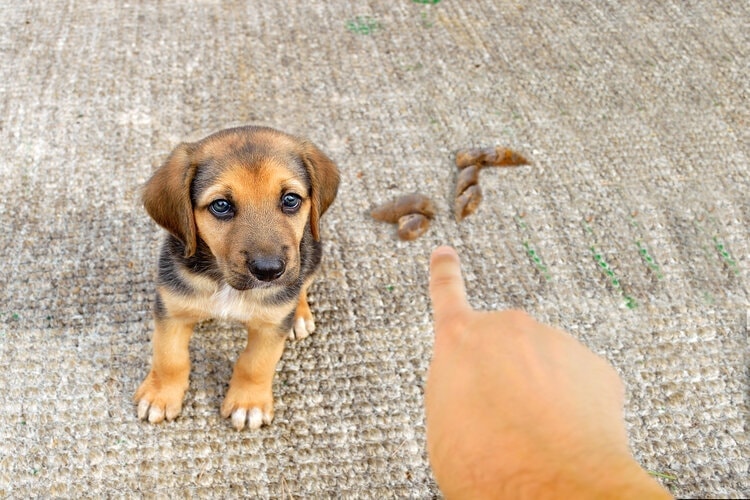
Nervous dogs might feel anxiety when in the backyard, so they will be hesitant or fearful just being outside at all. These dogs will attempt to go back inside as quickly as they can, which means defecating isn’t a priority for them.
What to Do
Plenty of time and patience is needed with these dogs. You should look into desensitization training. Take your dog into the yard, provide a treat or a toy, give them plenty of praise, and then go back inside. If you’re persistent and patient, your dog will start to learn that nothing bad happens when outside, and you’ll be able to increase the time of these sessions.
Double-check that there isn’t anything in the yard that might be causing them anxiety, like the neighbor’s dog or wind chimes. Look at your outdoor space with a critical eye so it can become an area that your dog will actually enjoy spending time in.
7. Easily Distracted
Some dogs are easily distracted, particularly the breeds with a high prey drive (looking at you terriers)! The world is full of small things that dart and move quickly, and for some dogs, there’s just too much entertainment going on to bother with trivial things like pooping.
In some cases, the dog might start to poop early on but becomes distracted by a squirrel, and then it’s time to go inside. Your dog wasn’t actually finished, which you will discover in an unpleasant way.
What to Do
Your best bet with an easily distracted dog is to take them to a designated pooping area. Keep your dog on the leash, and don’t move around much at all. This way, your dog will start to associate this one small area as the space where elimination occurs and nothing else. Don’t forget there should always be praise and treats after a success.
8. Scolding
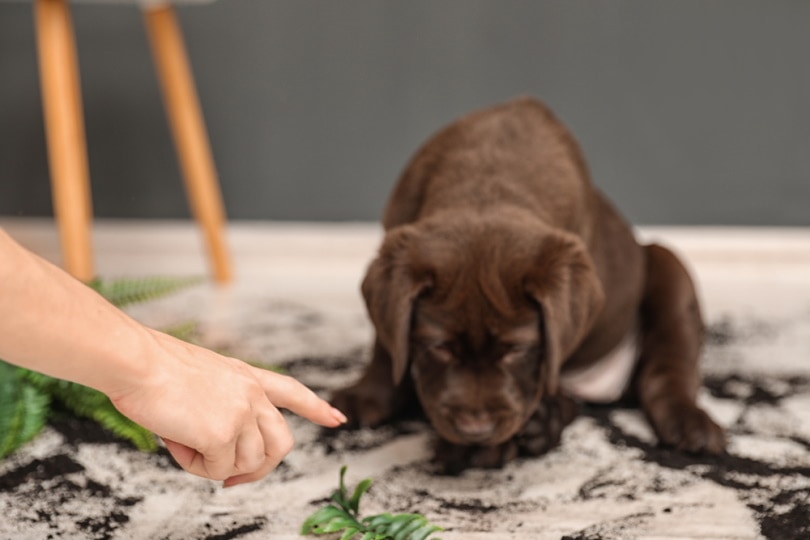
If a dog owner scolds their dog for pooping inside, most dogs will sneak off and poop somewhere else inside. Dogs sneak off because they’re trying to escape your punishment, but it’s also a form of appeasement behavior. It’s easier to poop out of sight and avoid your drama.
What to Do
First, never punish your dog for eliminating inside. Clean up the mess, and be sure to use an enzymatic cleaner to eliminate the odor. This will prevent your dog from using the same spot again. Make no fuss — no yelling or no praising.
Secondly, praise your dog for any time they eliminate outside. Give them treats and praise every time!

Conclusion
Dogs are just as picky as people! There can be all kinds of reasons that a dog won’t poop outside, everything ranging from a medical issue to pickiness about the surface or a change in the household.
Just as long as you’re aware of the problem and are willing to work with your dog and maybe your vet to fix the issue, it should eventually work itself out.
Featured Image Credit: ThamKC, Shutterstock

